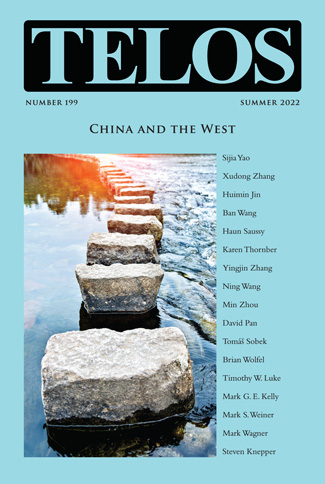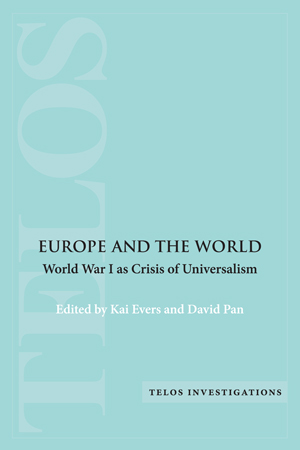In today’s episode of the Telos Press Podcast, David Pan talks with Eric Hendriks-Kim about his article “The Polemics of China’s Counter Cosmopolitanism,” from Telos 201 (Winter 2022). An excerpt of the article appears here. In their conversation they discuss the impetus behind the current proliferation of Chinese theories of cosmopolitanism; how these new ideas about cosmopolitanism fit into a history of anti-Western forms of universalism in various parts of the world; the idea of tianxia, its meaning and history, and how it is used today; how Jiang Shigong’s idea of socialism with Chinese characteristics differs from the theories based on the idea of tianxia; how Jin Huimin conceives of the relationship between universalism and particularity; the relationship of these Chinese notions of cosmopolitanism to Western notions of cosmopolitanism; and whether any of these conceptions escape from an imperialist perspective. If your university has an online subscription to Telos, you can read the full article at the Telos Online website. For non-subscribers, learn how your university can begin a subscription to Telos at our library recommendation page. Print copies of Telos 201 are available for purchase in our online store.
|
In today’s episode of the Telos Press Podcast, David Pan talks with Ban Wang about his article “The Clash of Civilization and World Community: The West and China,” from Telos 199 (Summer 2022). An excerpt of the article appears here. In their conversation they discuss whether it still makes sense to speak of distinct human cultures; if the very ideas of China and the West need to be discarded, or, if not, what the basis of such distinctions would be and why they persist; whether there is a human commonality that lies below and beyond age-old cultural norms, and if so what is its content and what forms does it take; how both Chinese and Western forms of universalism have converged to form a cosmopolitan unity; how multiculturalism and identity politics have undermined cross-cultural interaction and a universalist vision; and what alternatives there are for affirming both universalism and local culture. If your university has an online subscription to Telos, you can read the full article at the Telos Online website. For non-subscribers, learn how your university can begin a subscription to Telos at our library recommendation page. Print copies of Telos 199 are available for purchase in our online store. Telos 199 (Summer 2022): China and the West is now available for purchase in our store. Individual subscriptions to Telos are also available in both print and online formats.
It would be a mistake, though, to see China and the West as polar opposites or competing civilizations, separated by their opposing political interests on the one hand and by the history of each of their cultural traditions on the other hand. Even if they had separate long histories, the recent past has seen many more opportunities for interaction and orientation around common projects and problems. Moreover, since the past is always a projection from out of the present, the idea of a clash of civilizations is not a legacy but a project. An alternative endeavor would be to conceive of the relationship between China and the West as existing within a larger totality. The definition of such a totality must occur within a particular perspective, however, and therein lies the problem. China and the West are clearly competing to define the framework of global order. Consequently, any attempt to consider the relationship between the two must look to the vision of universality that each side is trying to establish against the other. This issue of Telos considers a variety of ways of defining the overarching perspective from which the comparison between China and the West makes sense. Social and economic disruptions in the wake of this spring’s virus will be unevenly distributed in intensity and time. Socially distanced rural suffering will long outlast the news cycle and panic.
Kentucky, where I live, expects our COVID-19 crisis to peak on Saturday, May 16, with 1,600 hospitalized and 240 in ICU beds on that day. By then, New York is expected to no longer need any COVID-19 beds. Their peak will have been a month and a half previous. Kentucky (more accurately, Lexington and Louisville) will probably be fine when we peak. Tennessee (e.g., Nashville and Memphis) probably won’t. Expect the news to have moved on by then. New from Telos Press: Europe and the World: World War I as Crisis of Universalism, edited by Kai Evers and David Pan. Order your copy in our online store, and save 20% on the list price by using the coupon code BOOKS20 during the checkout process.
David Pan’s “Cosmopolitanism, Tianxia, and Walter Benjamin’s ‘The Task of the Translator'” appears in Telos 180 (Fall 2017), a special issue on Cosmopolitanism and China. Read the full article at the Telos Online website, or purchase a print copy of the issue in our online store. Individual subscriptions to Telos are now available in both print and online formats. As a term, cosmopolitanism defies simple understanding. Already in its earliest formulation, attributed to the ancient Greek Cynic Diogenes, the merging of cosmos and polite to mean “citizen of the world” had a paradoxical meaning, imagining both local belonging as a citizen and lack of a specific place in the world. If the Cynics’ notion of cosmopolitanism arises out of a rejection of conventions in general rather than the embracing of a world system, they were left in an empty space between locality and universality. This tension between belonging and universality continues into the current discussion of cosmopolitanism as a term that spans political and cultural discussions. While the modern cosmopolitan political project seeks to lay out a common institutional framework for human society, the accompanying cultural project in fact works against such unity by seeking to promote the recognition and toleration of cultural differences. |
||||
|
Telos Press Publishing · PO Box 811 · Candor, NY 13743 · Phone: 212-228-6479 Privacy Policy · Data Protection Copyright © 2024 Telos Press Publishing · All Rights Reserved |
||||

 COVID-19 is a real crisis. It is unique for being concentrated for once in places where global travelers, professionals, and creatives live. When risk for those populations is controlled to a level they can accept, expect panic and restrictions to ease. Our world happily tolerates death tolls far in excess of the worst projected for COVID-19 when only rural people or people with a high school education or less are at high risk.
COVID-19 is a real crisis. It is unique for being concentrated for once in places where global travelers, professionals, and creatives live. When risk for those populations is controlled to a level they can accept, expect panic and restrictions to ease. Our world happily tolerates death tolls far in excess of the worst projected for COVID-19 when only rural people or people with a high school education or less are at high risk. 







